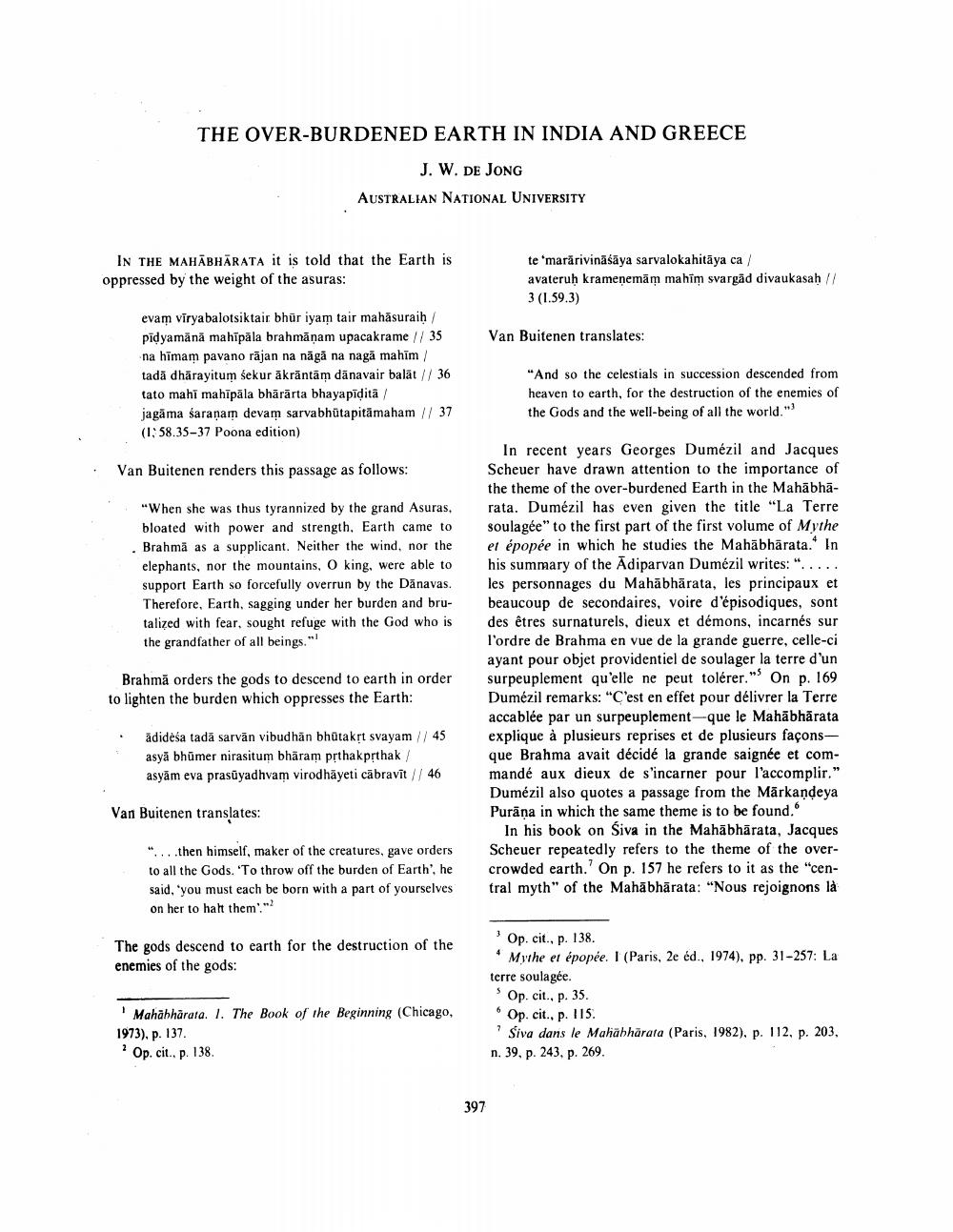Book Title: Over Burdened Earth In India And Greece Author(s): J W De Jong Publisher: J W De Jong View full book textPage 1
________________ THE OVER-BURDENED EARTH IN INDIA AND GREECE J. W. DE JONG AUSTRALIAN NATIONAL UNIVERSITY IN THE MAHĀBHÄRATA it is told that the Earth is oppressed by the weight of the asuras: te 'marărivināśāya sarvalokahitāya ca/ avateruh kramenemām mahīm svargad divaukasah // 3 (1.59.3) Van Buitenen translates: evam vīryabalotsiktair bhūriyam tair mahăsuraih / pidyamänä mahīpāla brahmānam upacakrame // 35 na hīmam pavano rājan na nāgā na nagā mahim / tadă dhārayitum sekur ākrāntām dānavair balat // 36 tato mahī mahīpāla bhārārta bhayapīdita / jagama saranam devam sarvabhūtapitämaham // 37 (1:58.35-37 Poona edition) "And so the celestials in succession descended from heaven to earth, for the destruction of the enemies of the Gods and the well-being of all the world.") Van Buitenen renders this passage as follows: "When she was thus tyrannized by the grand Asuras, bloated with power and strength, Earth came to Brahmä as a supplicant. Neither the wind, nor the elephants, nor the mountains, O king, were able to support Earth so forcefully overrun by the Dänavas. Therefore, Earth, sagging under her burden and brutalized with fear, sought refuge with the God who is the grandfather of all beings." In recent years Georges Dumézil and Jacques Scheuer have drawn attention to the importance of the theme of the over-burdened Earth in the Mahābhārata. Dumézil has even given the title "La Terre soulagée" to the first part of the first volume of Mythe et épopée in which he studies the Mahäbhärata." In his summary of the Adiparvan Dumézil writes: "..... les personnages du Mahābhārata, les principaux et beaucoup de secondaires, voire d'épisodiques, sont des êtres surnaturels, dieux et démons, incarnés sur l'ordre de Brahma en vue de la grande guerre, celle-ci ayant pour objet providentiel de soulager la terre d'un surpeuplement qu'elle ne peut tolérer."" On p. 169 Dumézil remarks: "C'est en effet pour délivrer la Terre accablée par un surpeuplement que le Mahābhārata explique à plusieurs reprises et de plusieurs façonsque Brahma avait décidé la grande saignée et commandé aux dieux de s'incarner pour l'accomplir." Dumézil also quotes a passage from the Märkandeya Puräna in which the same theme is to be found.o In his book on Siva in the Mahābhārata, Jacques Scheuer repeatedly refers to the theme of the overcrowded earth.' On p. 157 he refers to it as the "central myth" of the Mahābhārata: "Nous rejoignons là Brahmă orders the gods to descend to earth in order to lighten the burden which oppresses the Earth: adidesa tadā sarvān vibudhăn bhütakrt svayam // 45 asyā bhūmer nirasitum bhāram prthakprthak / asyām eva prasüyadhvam virodhāyeti cabravit // 46 Van Buitenen translates: "....then himself, maker of the creatures, gave orders to all the Gods. 'To throw off the burden of Earth', he said, 'you must each be born with a part of yourselves on her to halt them."? The gods descend to earth for the destruction of the enemies of the gods: Op. cit., p. 138. * Myhe et épopée. I (Paris, 2e éd., 1974), pp. 31-257: La terre soulagée. Op. cit., p. 35. * Op. cit., p. 115. Siva dans le Mahabharata (Paris, 1982), p. 112, p. 203, n. 39, p. 243, p. 269. Mahabharata. 1. The Book of the Beginning (Chicago, 1973), p. 137. Op. cit., p. 138. 397Page Navigation
1 2 3 4
